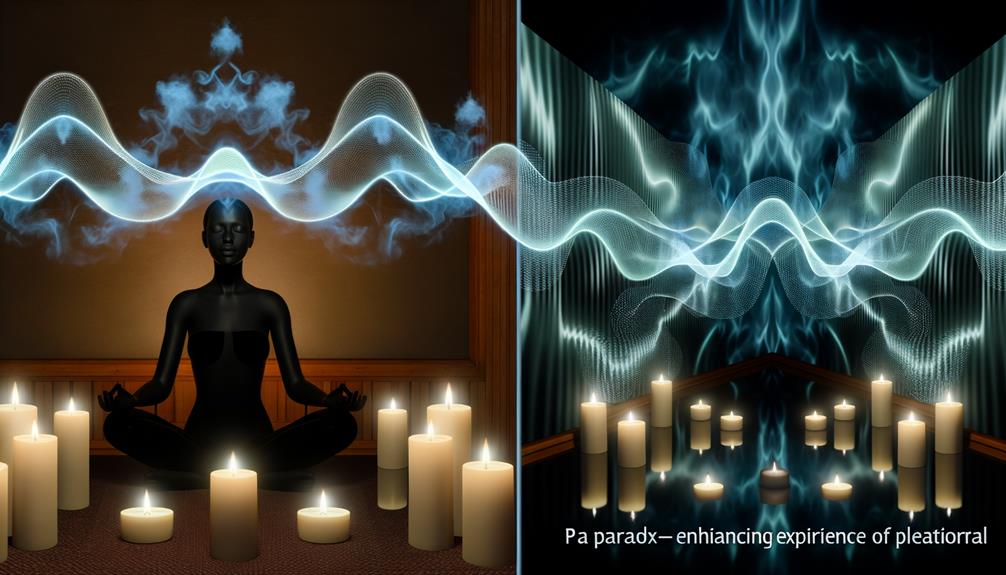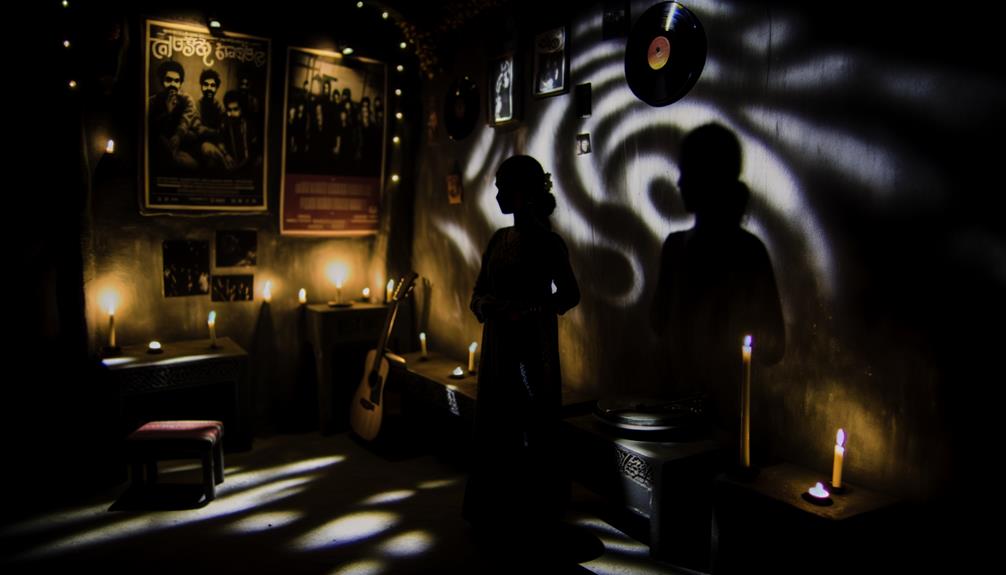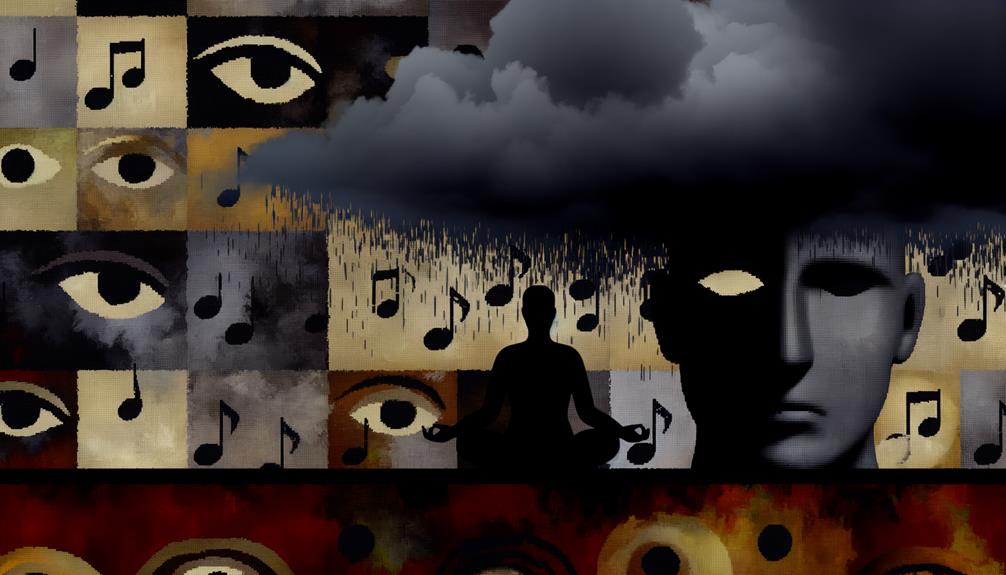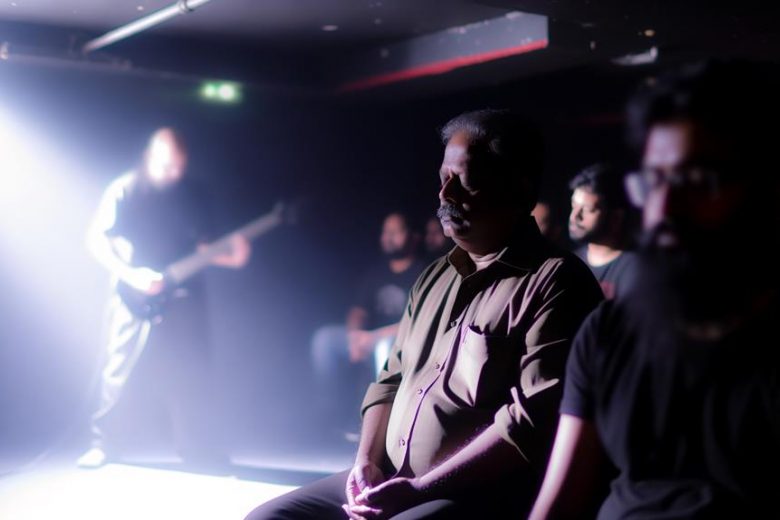Have you ever wondered if doom metal, with its heavy and somber tones, could actually help trauma victims? While it might seem counterintuitive, there's growing evidence that this genre offers a unique form of emotional release. By embracing themes of despair and hope, doom metal allows listeners to process complex feelings in a supportive environment. Fans often find a sense of community and validation, which can be vital for healing. But how exactly does this music work its magic, and what do critics have to say? The answers might surprise you.
Contents
Historical Context of Metal Music
The historical context of heavy metal music, including doom metal, is steeped in controversy and misunderstanding. In the 80s and 90s, heavy metal faced significant criticism, accused of promoting devil worship, drugs, and violence. These allegations heavily influenced public perception, stigmatizing both the music and its fans. High-profile court cases scrutinized claims of subliminal messaging in metal records, further entrenching the belief that the genre fostered delinquency and mental health issues.
Historically, psychologists raised concerns about heavy metal's impact on mental health, pointing to studies that suggested correlations with suicide and substance use. It's understandable why you might feel apprehensive about exploring this music, given its fraught history. However, it's essential to recognize that these early studies often lacked nuance and failed to account for the positive emotional responses that many metal fans experience.
As perceptions have shifted, recent research presents a more balanced view. Contrary to earlier beliefs, metal fans are more likely to be victims rather than perpetrators of crime. Organizations like the Sophie Lancaster Foundation advocate for the recognition of alternative subcultures in hate crime statistics, acknowledging the community's vulnerability to discrimination.
This cultural shift has led to a deeper understanding of the therapeutic benefits of heavy metal music. For many, particularly those marginalized, the metal community offers a supportive space for emotional processing and expression. It's not just about loud music; it's about finding a sense of belonging and using the music as a tool for coping with mental illness and emotional challenges. This evolving perspective can open new avenues for therapy work and provide you with a unique means of emotional support.
Therapeutic Benefits of Heavy Metal

Imagine finding solace in a place where your deepest emotions are not only understood but amplified through powerful, resonant music. Doom metal offers a therapeutic outlet for trauma victims by facilitating emotional processing. Its heavy, reflective soundscapes allow you to confront intense feelings like sadness and despair, creating a unique space for healing.
Doom metal's themes often explore life, death, and existential struggles, resonating deeply with those maneuvering through trauma. This connection can foster a sense of understanding and validation, critical for mental health recovery. Many fans report that the genre's cathartic qualities help them process their experiences and emotions related to trauma. It's not just about listening; it's about feeling understood.
Engaging with doom metal can also create a supportive community. As someone who shares similar struggles, you can find a space where discussions around mental health are not only accepted but encouraged. This community offers a sense of belonging, reducing feelings of isolation and promoting resilience.
Here are three key therapeutic benefits of engaging with doom metal:
- Emotional Processing: The music's heavy, reflective nature facilitates confronting and understanding deep emotions, aiding in trauma recovery.
- Cathartic Qualities: The powerful soundscapes and themes of existential struggle provide a means to release pent-up emotions, offering a form of emotional cleansing.
- Supportive Community: Connecting with others who share your experiences can provide invaluable social support and foster a sense of belonging.
Incorporating doom metal into your coping mechanisms can be a powerful step towards resilience and mental health recovery, offering both personal and communal support.
Heavy Metal Therapy Initiative

Engaging with the Heavy Metal Therapy Initiative can be a transformative experience for those grappling with intense emotions and trauma. This initiative underscores the therapeutic value of connecting with extreme music, particularly doom metal, to confront difficult emotions and foster emotional processing. You'll find that this isn't just about listening to music; it's about integrating it into your mental health journey.
The initiative thrives on peer support within the metal community, offering a space where marginalized individuals can share their experiences and discuss mental health issues. This sense of belonging can be essential when maneuvering through trauma and seeking personal growth.
| Key Element | Description |
|---|---|
| Emotional Processing | Using doom metal to explore and articulate complex feelings |
| Peer Support | Community-based support from fellow metal enthusiasts |
| Lyrical Themes | Resonating with themes of despair and hope to maneuver through trauma |
| Personal Growth | Developing resilience and coping strategies through musical engagement |
| Community Support | Informal therapeutic practices anchored in shared experiences |
Participants often report that doom metal serves as a healthy outlet for intense emotions. The heavy, slow-paced music allows you to immerse yourself in a soundscape that mirrors the weight of your struggles, facilitating emotional release and resilience.
Focusing on lyrical themes, doom metal often resonates with feelings of despair and hope, making it easier for you to relate and process your trauma. The initiative encourages exploring these themes as a way to better understand and manage your emotional landscape.
Personal Testimonies and Experiences

Among the many voices sharing their journeys, personal testimonies reveal how deeply doom metal can resonate with those experiencing trauma. If you've ever felt that the weight of your mental and emotional burdens is too heavy to bear, you're not alone. Many fans of doom metal report that its reflective qualities and themes of life and death provide a sense of understanding and validation during their struggles with trauma and mental health issues.
Here are three ways doom metal has been a profound source of solace and healing:
- Emotional Processing: Tracks like "Mirror Reaper" by Bell Witch are often cited by listeners as powerful tools for emotional processing. These songs help you confront and navigate your feelings of despair and loneliness, offering an emotional outlet that feels both safe and relatable.
- Introspection and Calmness: Doom metal's minimalist droning and sonic chaos can evoke calmness and introspection. This can allow you to explore your emotions in a controlled environment, making it easier to understand and manage your trauma.
- Community and Connections: The sense of community among doom metal fans fosters connections and shared experiences. This creates an environment where you can feel less isolated in your trauma journey, knowing others have walked a similar path and found strength through the music.
Personal testimonies consistently highlight that doom metal serves as a soundtrack for healing. Its emotionally charged lyrics and compositions offer you solace and strength, helping you feel less alone in your struggles. By embracing this unique genre, you might find a powerful ally in your journey toward emotional and mental well-being.
Criticism and Societal Perceptions

Criticized for its dark and brooding themes, doom metal often faces societal perceptions that unfairly link it to negative behaviors and emotional instability. Critics argue that its slow tempos and heavy themes might reinforce feelings of sadness or hopelessness in trauma victims, rather than promoting healing. These criticisms, however, don't always take into account the personal experiences of those who find solace in this genre.
For many fans, doom metal serves as a powerful tool for emotional expression and coping. In the face of trauma, the reflective and cathartic nature of the music allows them to process their emotions, countering the stigma surrounding it. Societal perceptions often overlook the therapeutic benefits that this genre can offer. It's not just about listening to dark music; it's about finding a medium through which one can confront and work through complex emotions.
Moreover, the doom metal community itself provides a supportive environment where individuals dealing with trauma can find a sense of belonging and validation. This community aspect is essential for healing, as it offers a space where people can share their experiences and feel understood. Misconceptions about doom metal lead to its exclusion from discussions about music therapy, despite evidence suggesting it can be beneficial for those who need an outlet for their pain.
Ultimately, while doom metal may face criticism and societal stigma, its potential for aiding in emotional expression and trauma coping shouldn't be dismissed. By understanding and acknowledging its therapeutic benefits, we can better support those who find healing within its heavy, somber tones.
Conclusion
Ultimately, doom metal offers trauma victims a powerful tool for emotional healing. By embracing its cathartic qualities, you can process complex feelings and find solace in a supportive community. Personal testimonies and evidence-based insights highlight its benefits, validating your experiences and reducing isolation. While societal perceptions may vary, remember that your journey is unique. Through doom metal, you've found a therapeutic outlet that promotes introspection and healing, empowering you to navigate your emotional landscape.
